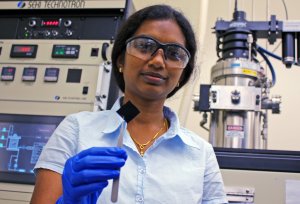Sep 28 2009
Researchers at Purdue's Birck Nanotechnology Center are collaborating with Indian colleagues at the Jawaharlal Nehru Center for Advanced Scientific Research and General Electric Co.'s John F. Welch India Technology Center to launch a center focused on how advancements in nanomaterials can address growing energy needs.
 Bhuvana Thiruvelu, a postdoctoral research associate at the Birck Nanotechnology Center in Purdue's Discovery Park, demonstrates her research in which carbon nanotubes are grown from palladium nanoparticles on what's called a "buckypaper" sheet. (Purdue News Service photo submitted by Jeff Goecker)
Bhuvana Thiruvelu, a postdoctoral research associate at the Birck Nanotechnology Center in Purdue's Discovery Park, demonstrates her research in which carbon nanotubes are grown from palladium nanoparticles on what's called a "buckypaper" sheet. (Purdue News Service photo submitted by Jeff Goecker)
The Joint Networked Center on Nanomaterials for Energy, funded by the Indo-U.S. Science and Technology Forum, is supporting the exchange of four graduate student researchers, two postdoctoral researchers and two faculty members annually between Purdue and Jawaharlal Nehru Center's International Center for Materials Science in Bangalore, India. The international program also is placing two Purdue graduate student interns at GE's Technology Center each year.
"Students will have the opportunity to spend several months at partner institutions, formulating and working on joint research projects to solidify and expand ongoing collaborations between the Jawaharlal Nehru Center for Advanced Scientific Research and Purdue for advancing research in how nanomaterials can address growing energy needs," said Pankaj Sharma, associate director of operations and international affairs for Purdue's Discovery Park.
Arbinda Mitra, executive director of the Indo-U.S. Science & Technology Forum, said: "There also are internship opportunities for Purdue students to work for up to 20 weeks at GE's Technology Center."
The exchange has already started. Currently, T. Bhuvana, a doctoral graduate from the Jawaharlal Nehru Center, is at the at Birck Nanotechnology Center researching nanoscale forms of carbon such as nanotubes and graphene, or ultra-thin flakes of graphite, for potential use in solar cells and batteries. In Bangalore, Purdue doctoral student Adina Scott is at the Jawaharlal Nehru Center, and fellow Purdue graduate student Kevin McMullen is doing research there for GE.
Nanomaterials, defined as synthetic particles or fibers less than 100 nanometers in diameter, have applications in a wide range of everyday objects. Carbon nanotubes, for example, are used as conductive wires, and polymer-based nanocomposites and nanostructured ceramics have fire resistant, conductivity and stiffness properties.
The joint center's lead coordinating faculty in India are professor G.U. Kulkarni, chair of JNCASR's Chemistry and Physics of Materials Unit; and professor Umesh Waghmare of Jawaharlal Nehru Center's Theoretical Sciences Unit.
Mano Manoharan, general manager of operations at GE's Bangalore Global Research Center, and Sunil Murthy, lead engineer with GE, oversee the internship program in India.
Purdue's team is led by Timothy Fisher, a mechanical engineering professor at Birck; and Timothy Sands, the Mary Jo and Robert L. Kirk Director at Birck. Sharma and A.N. Jaychandra, the administrative officer at the Jawaharlal Nehru Center, are providing administrative leadership for the new joint center.
"This new initiative will focus on providing wonderful new opportunities for students and postdoctoral researchers to expand their perspectives both technically and culturally," Kulkarni said.
Said Waghmare, "Our hope is that participants will better conceive new discoveries and develop them into technologies that offer the promise of breakthroughs in energy with global impact."
In August 2008, a research team from Purdue's Discovery Park joined colleagues at the Jawaharlal Nehru Centre and GE's Welch Technology Centre for a joint workshop in Bangalore on how to improve the energy transport, conversion and efficiency of nanomaterials. That event was co-sponsored by the Indo-U.S. Science and Technology Forum.
Fisher, who leads the thermalHUB project at Discovery Park, spent five months in late 2007 and early 2008 in Bangalore collaborating on carbon nanotube research with professor C.N.R. Rao, honorary president of the Jawaharlal Nehru Center and a 1958 Purdue graduate. Purdue graduate student Kyle Smith of Birck accompanied Fisher during the sabbatical visit.